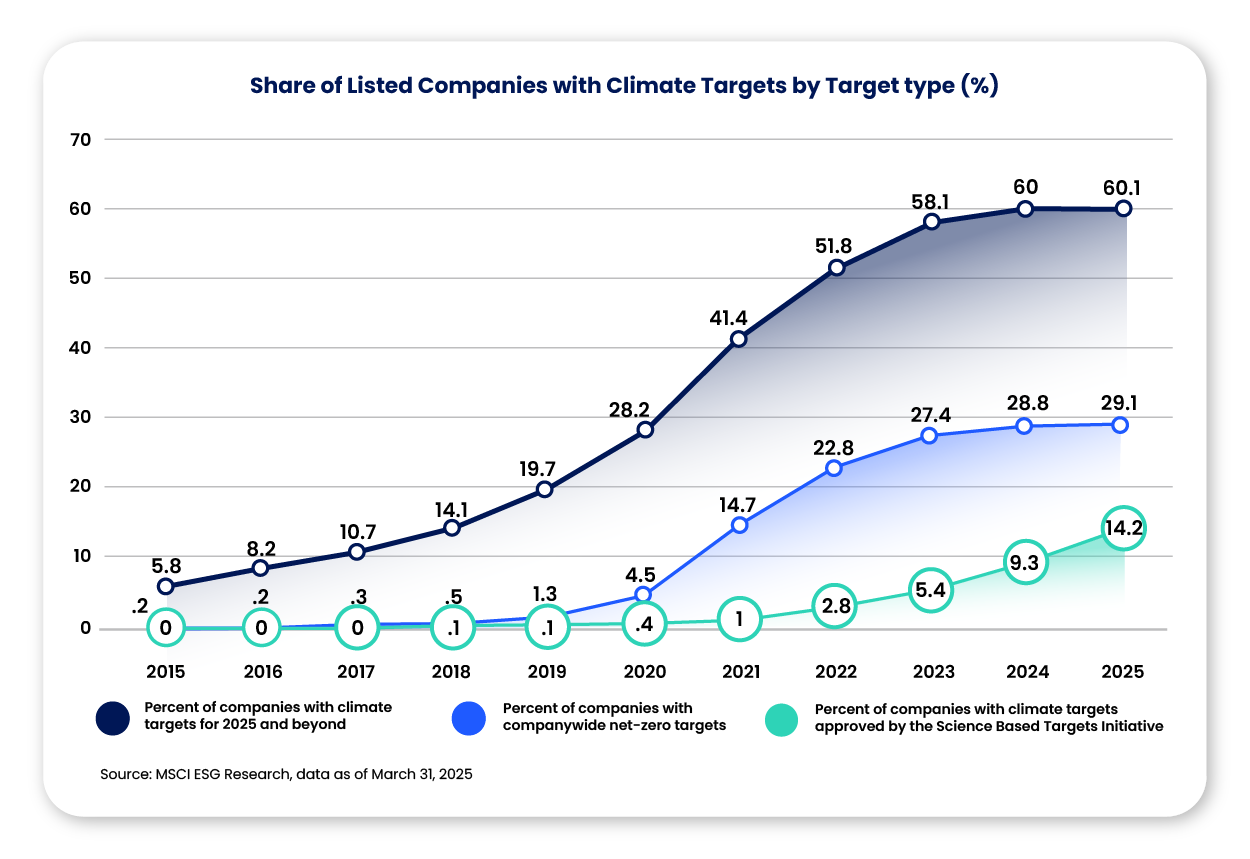Sustainability, Scope 3 emissions, and net zero. These and other concepts falling under the ESG banner have been hot topics in procurement and supply chain management in recent years. However, in 2025 there is a resounding narrative that companies are abandoning these goals.
Recent data, including from Avetta’s own network, shows the reality is more mixed.
Climate Commitments Hold Firm
MSCI’s recent Transition Finance Tracker shows that 60.1% of listed companies have published climate commitments as of 2025. Although this percentage was essentially flat to 2024’s percentage, it is not the retreat that it has been claimed in some headlines.
Companies are increasingly developing Science Based Targets initiative (SBTi) validated targets as well, rising to 14.2% of listed companies in 2025, up nearly 5 points from only a year earlier. The industrials sector lead in SBTi validated targets.

These commitments deeply affect companies’ procurement functions, considering 75%+ of companies’ emissions come from their supply chains (Scope 3). As such, leading Chief Procurement Officers (CPOs) report continuing to further goals in 2025 to meet sustainable procurement metrics.
Markets Face Scrutiny Asymmetrically
Although some companies may be retreating from ESG commitments under geopolitical pressure and delayed timelines for mandatory reporting, others are facing increased regulatory and market scrutiny.
Energy is especially affected. The EU Council’s sanctions packages are phasing out imports of Russian crude oil and refined products, with full bans on seaborne crude already in effect and natural gas reductions continuing through REPowerEU. At the same time, the EU isn’t just seeking replacement volume — it’s raising the bar on how that energy is sourced, embedding ESG criteria into its energy transition and procurement strategies. Suppliers with strong environmental and social credentials can secure longer-term EU contracts; this connection is especially bearing out in the LNG market. Sustainability is essentially serving as a market entry requirement.
The energy and banking sectors in the UAE are also under greater pressure to report on sustainability efforts following the first year of disclosure under the UAE’s Securities and Commodities Authority (SCA). Chinese listed companies also have national ESG disclosure mandates, requiring reporting by 2026, which will especially impact industries like energy, heavy industrials, automotive, and EV supply chains.
Ocean freight is under the microscope as well. Shipping emissions started being priced in the EU in 2024, a scheme that is set to expand in 2025. Ships are also now being rated for environmental performance, while customers and capital providers are increasingly holding ESG performance in this sector as a requirement to access capital or secure contracts. A landmark international agreement to make the sector net zero was also adopted by the UN’s International Maritime Organization in April 2025.
Managing ESG risks and reporting across these industries will continue to be an imperative in 2025 and beyond.
Discover how prequalification, compliance, audits, and financial health impact safety—and uncover strategies to build a safer, more resilient supply chain with the 2025 Avetta Insights and Impact Report.
Avetta Sees Similar Trends
Despite the narrative around deprioritization of ESG risk management within the supply chain, Avetta has seen adoption rates of its sustainability offering grow by nearly 5% so far in 2025. User engagement within the platform on ESG topics is already 7% higher than all of 2024, only five months into the year.
Increased supplier engagement with Avetta’s ESG suite is disproportionately coming from sectors including utilities, engineering and construction services, metals & mining, and marine transport.
Suppliers using Avetta’s sustainability offering in 2025 showcase growth in maturity in their management of ESG risks as well. Of suppliers using the product, nearly 18% more report having a GHG emissions measurement program in 2025 compared to 2024. 16% more than in 2024 report having policies in place to prevent child and forced labor.
Avetta is seeing continued interest in supply chain sustainability solutions and steady improvements from suppliers taking action to meet rising ESG risks.
Risk is the Top Concern Globally – Across Industries
Avetta is hearing a similar story anecdotally from supply chain leaders and Chief Procurement Officers (CPOs). The majority of CPOs identify risk management and supply chain resiliency as their top concerns in 2025. Yet, according to McKinsey’s 2024 Global Supply Chain Leader Survey, only 30% of senior supply chain leaders say their boards have the deep understanding of supply chain risks needed.
The same survey found that 81% of supply chain executives consider multi-tier supplier visibility a top priority this year. CPOs increasingly recognize that a strong, sustainable procurement program not only reduces risk but also serves as a strategic differentiator. These programs can enhance resiliency during unexpected disruptions, drive supplier engagement, improve performance across multiple ESG metrics, and even unlock innovation in product development and operations.
To better manage these risks, procurement leaders are turning to advanced supply chain tools — 58% are investing in AI-based solutions. However, only 18% believe they are fully realizing the value of these technologies (Procurement Leaders Insights 2025). AI-enabled tools to manage supply chain risk are essential for procurement leaders, but tools must also address supply chain visibility and engagement. Building smarter, more collaborative supply chains is essential — not just to meet sustainability targets, but to stay competitive in a rapidly evolving global landscape.
Avetta’s sustainability suite includes AI-based components but also helps companies strengthen supplier collaboration in order to manage ESG and other critical priorities across their supply chains.
👉 Learn more at https://www.avetta.com/clients/solutions/sustainability-esg-dei/esg-sustainability-regulations









